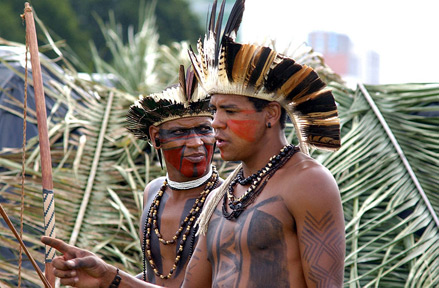Protecting the sanctity of indigenous foods and cultures
Indigenous peoples inhabit more than 85 percent of the Earth's
protected areas, yet only 1 percent of the billions of dollars spent
each year on philanthropy goes to indigenous peoples and the ecosystem
services they support. Indigenous communities have inherited
millennium-tested traditional ecological knowledge, land-based life
ways, and a holistic, interdependent relationship to the Earth. In State
of the World 2013: Is Sustainability Still Possible?, contributing
authors discuss the value of the relationship that indigenous groups
have developed and maintained between native lands and waters, including
through the cultivation of native foods.
"According to many native traditions, to live well is the goal of
life," says Melissa K. Nelson, contributing author and associate
professor of American Indian studies at San Francisco State University.
"And to live well means not only sustaining foods and a lifestyle but
actually regenerating the ecological systems that people depend on to
enhance their happiness and spirit."
|

Two Indians of the Pataxo tribe in Brazil wearing
traditional attire during a demonstration. |
Many indigenous communities know how to grow, nurture, harvest,
process, cook, and feast on native foods in a way that can sustain both
an ecosystem and a society.
This is a result of a long tradition of intergenerational knowledge
transmission. It is how the Paiute in Utah know how to gather and
prepare tule bulbs as foods, how the Pomo in California know how to
gather and process acorns, and how the Tohono O'odham in the Sonoran
Desert know how to take an heirloom tepary bean and grow it in a
beautiful desert garden.
Forced evictions
By occupying nearly 20 percent of the Earth's surface, indigenous
groups, who live in 80 percent of the planet's biological diversity
hotspots, are acting as caretakers of these biodiverse places. Many
indigenous communities and ecosystems, however, are at risk due to a
lack of rights and fair treatment by governments and corporations.
"Forced evictions devalue not only the importance of indigenous
communities but also the traditional ecological and agricultural
knowledge these groups possess," said Rebecca Adamson, contributing
author and founder of First Peoples Worldwide. "By removing indigenous
groups from their lands or recklessly exploiting natural resources such
as minerals and forests, corporations and governments are effectively
erasing thousands of years of practiced traditional ecological knowledge
- the cumulative body of experience an indigenous group has collected
over generations, encompassing knowledge, practices, and beliefs about
their customary lands."
In State of the World 2013, contributing authors examine the sanctity
of native foods and the potential benefits that society could harvest by
tapping into the wealth of ecological knowledge that indigenous
communities hold and respectfully share.
The significance of sacred foods
Many indigenous communities have certain foods - including corn,
taro, and wild rice - that are considered sacred and have profound
teachings and practices associated with them. One of the most
significant ways that indigenous peoples have demonstrated a respectful
relationship to their sacred foods is through sustainable land and water
practices.
Because these totem foods are so highly regarded, it is considered a
tragedy and a violation of fundamental rights that they are now being
threatened with life patenting and genetic modification.
Native foods and ecosystem health
Native foods are markers of diversity and are often keystone species
for the health of an ecosystem and the health of a people. The body of
knowledge that indigenous communities hold concerning the cultivation of
foods and the conservation of habitats are viable and potentially
essential alternatives to some of today's more unsustainable practices.
Without healthy seeds, lands, and waters, native foods will continue to
be compromised, damaged, and made scarce, and the health of ecosystems,
native communities, and all communities will suffer.
Respecting indigenous communities, their land, and their traditions
is an invaluable resource in our efforts to combat climate change.
Defending indigenous rights involves governments implementing policies
that protect indigenous groups, corporations engaging in mutually
beneficial relations with indigenous communities and the environment,
and nongovernmental organisations (NGOs) creating funding models and
grants that help to support and grow indigenous societies.
It is clear that maintaining and strengthening indigenous
self-determination needs to become a top priority and a collaborative
effort among governments, policy-makers, NGOs, private corporations, and
indigenous communities themselves. Such efforts could help put us on the
path toward sustainability by increasing food security, protecting
biologically diverse hotspots, and improving our resilience to climate
change.
- Worldwatch Institiute |

